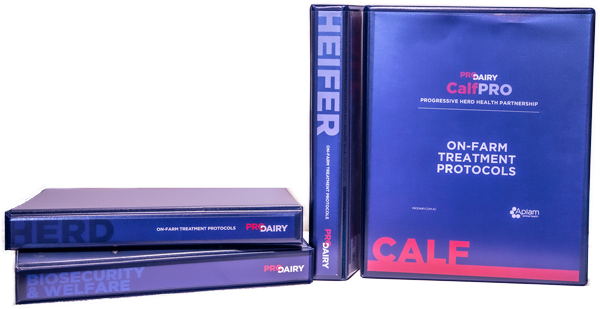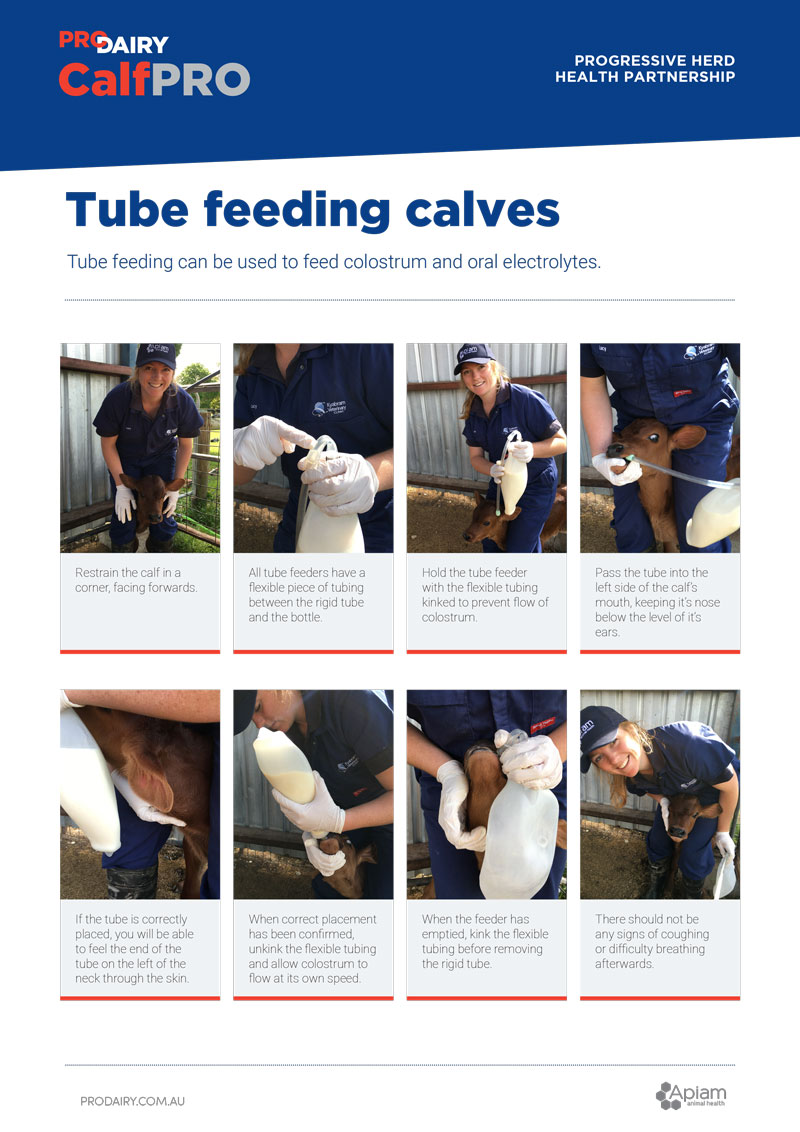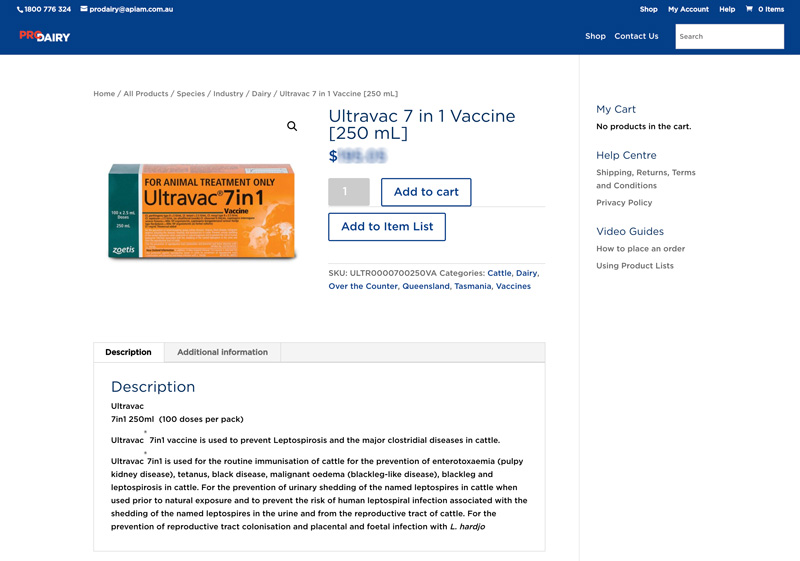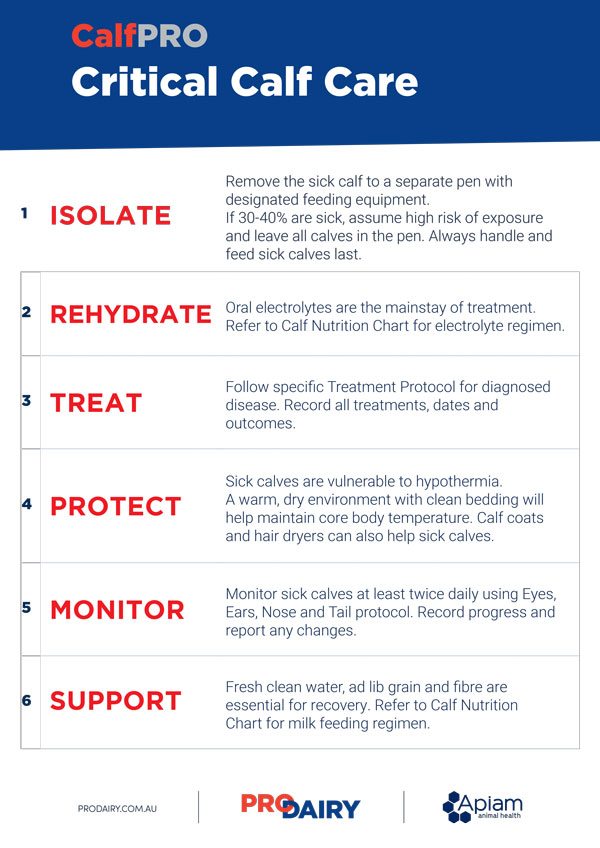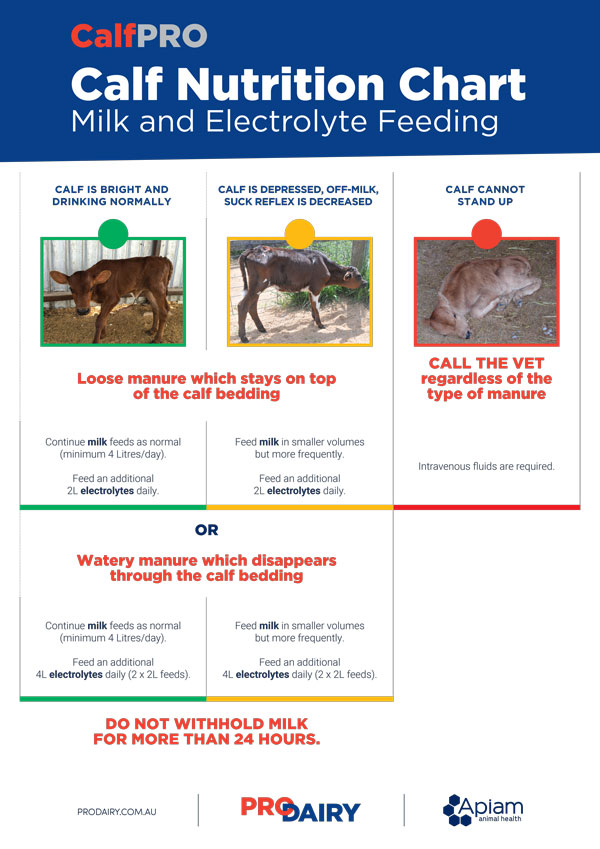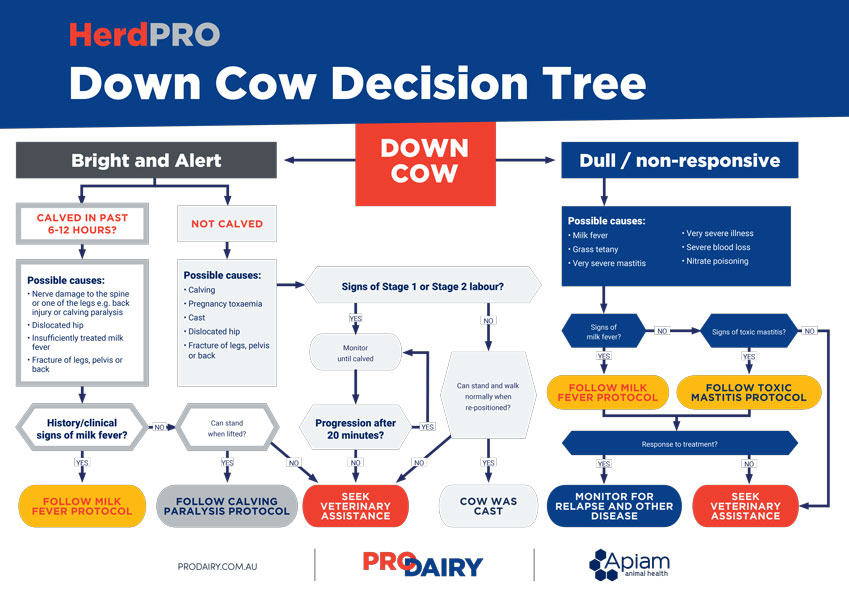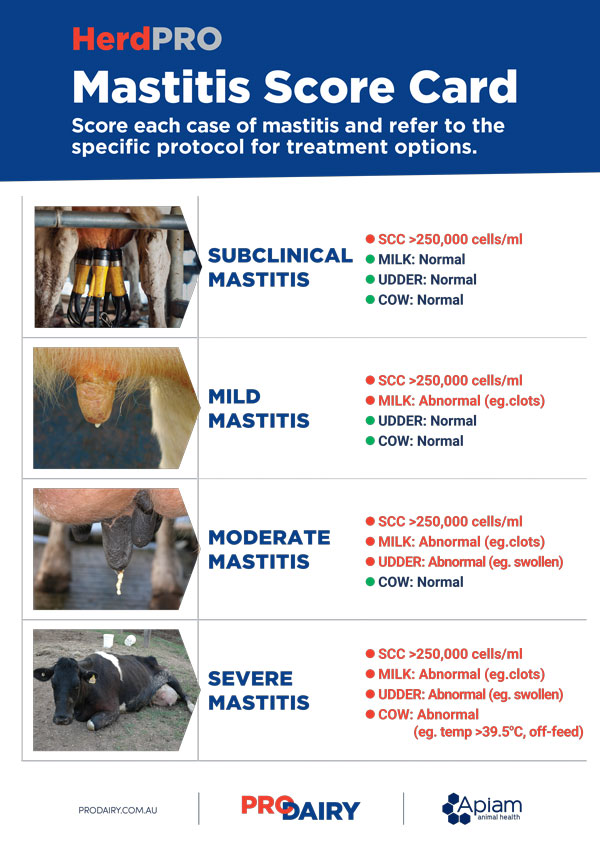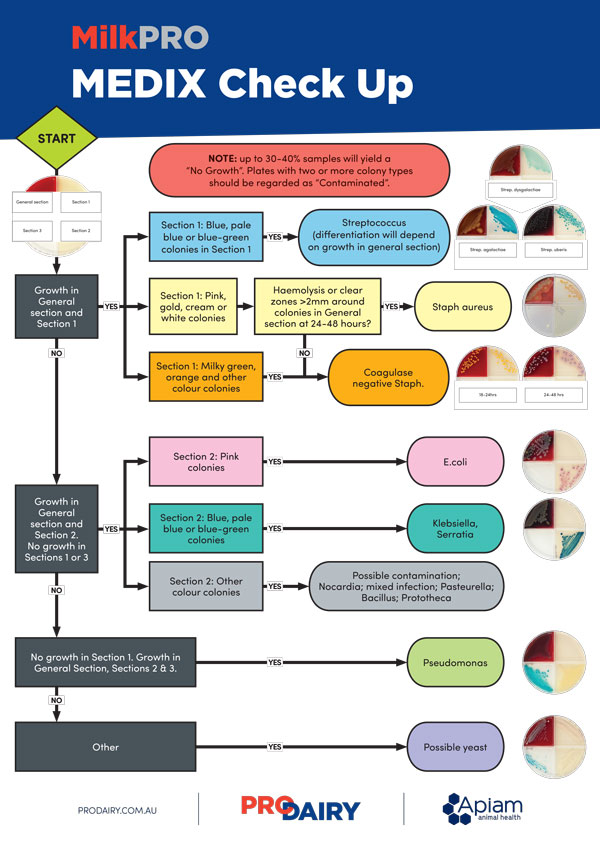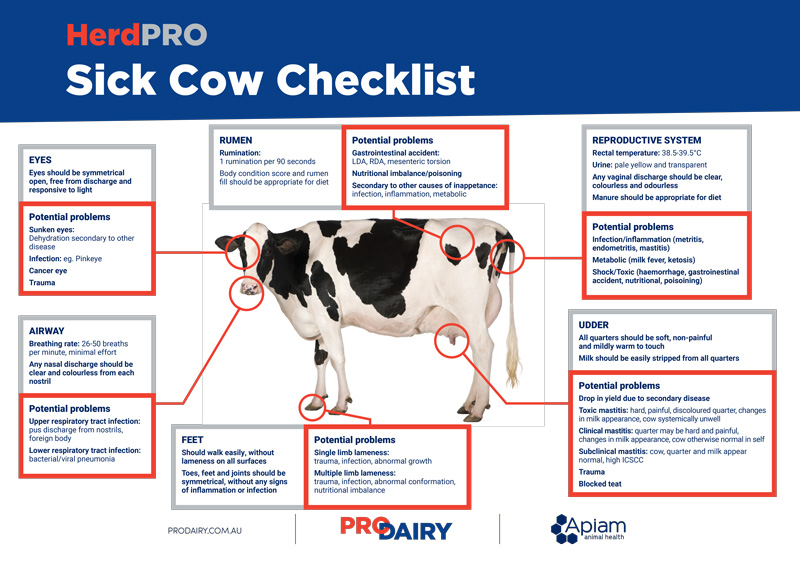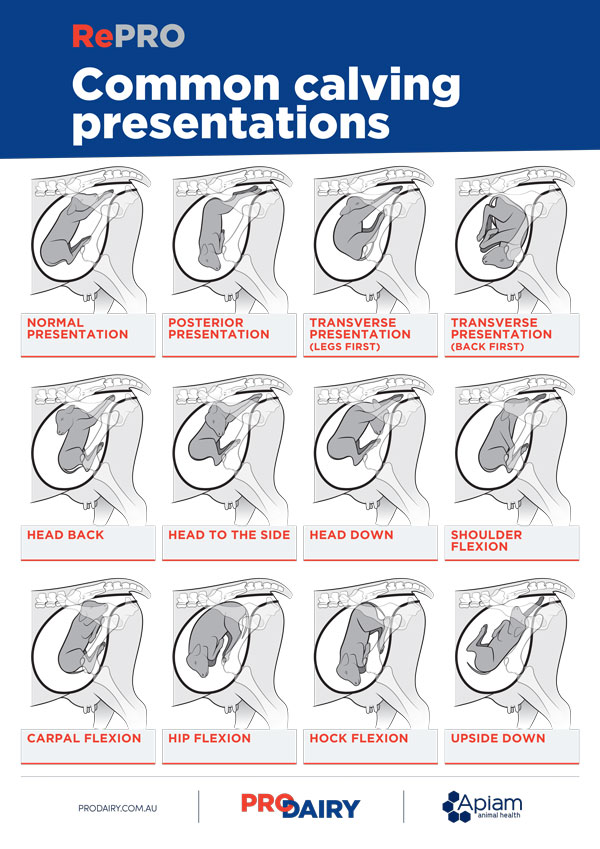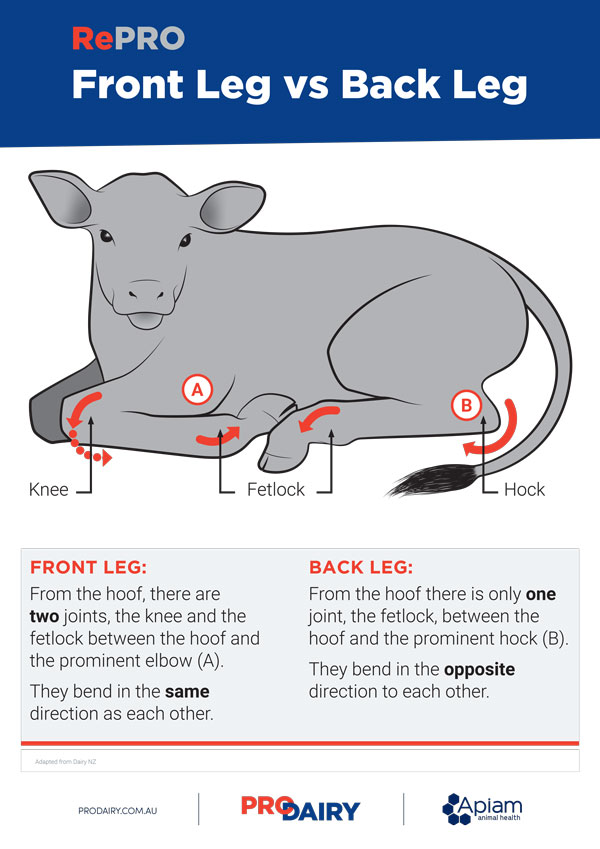PRODAIRY.
WE’VE GOT YOU COVERED.
Designed for Dairy Farmers.
Delivered by Dairy Vets.

Dairy Australia
Foot-and-Mouth Disease webinar
July 2022
ProDairy Partner Inclusions
ProDairy Partnership Brochure
Download the ProDairy Partnership brochure for a comprehensive snapshot of the programs benefits.

animal health protocols

DIRECT ONLINE ORDERING
- Online ordering and payment system
- Directly linked to individual farm herd health treatment protocols
- Access to dairy consumables and merchandise

VETERINARY SERVICES
Discounted fees (-20%) on selected veterinary services:
- Colostrum management investigation
- Milk quality investigation
- Reproductive performance investigation
- Biosecurity plan
- Animal welfare plan
- Individual tailored courses

GROUP TRAINING COURSES AND FARM RESOURCES
- Range of training topics
- Face-to-face and on-line options
- Optical Brix Refractometer
- HerdPRO – Poster Series
- HeiferPRO – Poster Series
- CalfPRO – Poster Series

RISK MANAGEMENT AND PLANNING
- Pre-calving care
- Colostrum management
- Herd fertility
- Milk quality and mastitis management
- Annual ProDairy Focus Plan
Read what our vets and ProDairy member farmers have to say about ProDairy.
Animal Health Protocols
Direct Online Ordering
Veterinary Services
ProDairy Partners benefit from a 20% discount on selected veterinary services, which include:
This proactive approach helps ensure efficiency and profitability whilst maintaining animal health and wellbeing to the highest standards.
Risk Management & Planning
An annual Herd Profile Survey is completed for each ProDairy Partner, along with risk assessments in the following areas of the farming system:
- Pre-calving care: identifies risks in key areas of pre-calving management to help prevent periparturient problems and assist with neonatal calf care for the upcoming calving period.
- Colostrum management: reviews current practices involving Quickly, Quality, Quantity, Collection, Storage and Handling of colostrum.
- Reproductive performance: assesses the key areas which can affect your herd fertility, providing valuable information for instigation of change and improvement.
- Milk quality: reviews the current milk quality and mastitis management and defines the high-risk areas for further improvement.
Your vet will help you develop a ProDairy Focus Plan for the next 12 months to allow prioritisation of goals, for which progress can be measured. The Focus Plan for your herd will assist in driving actions to achieve better results.
Training & Farm Resources

Group Training Courses and Farm Resources
- Range of training topics
- Face-to-face and online options
- Optical Brix Refractometer
- HerdPro – Poster Series
- HeiferPro – Poster Series
- CalfPro – Poster Series
- Animal Health Protocols
- Direct Online Ordering
- Veterinary Services
- Risk Management & Planning
- Training & Farm Resources
ProDairy Partners benefit from a 20% discount on selected veterinary services, which include:
This proactive approach helps ensure efficiency and profitability whilst maintaining animal health and wellbeing to the highest standards.
An annual Herd Profile Survey is completed for each ProDairy Partner, along with risk assessments in the following areas of the farming system: Your vet will help you develop a ProDairy Focus Plan for the next 12 months to allow prioritisation of goals, for which progress can be measured. The Focus Plan for your herd will assist in driving actions to achieve better results.

Group Training Courses and Farm Resources
- Range of training topics
- Face-to-face and online options
- Optical Brix Refractometer
- HerdPro – Poster Series
- HeiferPro – Poster Series
- CalfPro – Poster Series
Get in Touch
ProDairy Factsheets & News
Border Veterinary Clinic
Barham 03 5453 3159
Cohuna 03 5456 2709
Leitchville 03 5456 7334
Kerang 03 5452 2094
bordervets.com.au
Deniliquin Vet Clinic
03 58815488
denivet.com.au
Finley Vet Clinic
03 5883 3833
finleyvet.com.au
Devoted Vets (Warragul)
03 5623 2525
devotedvets.com.au
Gippsland Veterinary Hospital
Maffra 03 5147 1177
Sale 03 5144 3100
maffravet.com.au
Kyabram Veterinary Clinic
Kyabram 03 5852 4600
Nathalia 03 5866 2860
kyabramvets.com.au
Livestock Logic (Hamilton)
03 5572 1419
livestocklogic.com.au
Warrnambool Veterinary
Warrnambool 03 5559 0222
Port Fairy 03 5568 6222
Koroit 03 5559 0260
Nullawarre 03 5559 0270
wvc.com.au
Scottsdale Veterinary Services
03 6352 2996
scottsdalevets.com.au
Smithton Veterinary Service
03 6452 6333
smithtonvet.com.au
Terang & Mortlake Vet Clinic
Terang 03 5592 2111
Mortlake 03 5599 2612
terangmortlakevetclinic.com.au
ProDairy Timboon
Timboon 03 5559 0234
ProDairy Korumburra
Korumburra 03 5616 2727
Privacy Statement
Apiam Animal Health Limited ACN 604 961 024
INTRODUCTION
Apiam Animal Health Limited and each of its subsidiaries (‘Apiam’, ‘our’, ‘we’ or ‘us’) take your privacy and security very seriously. We respect your rights to privacy under the Privacy Act 1988 (Cth) (“Act”) and we comply with all of the Act’s requirements in respect of the collection, management and disclosure of your personal information.
This policy relates only to the personal information management practices of Apiam.
Personal information means information that identifies you as an individual, or from which your identity can reasonably be ascertained.
This Policy describes how we collect, store, use and disclose personal information and explains your rights to access and correct that information or make a complaint about the handling of your personal information (regardless of the form of the information and whether the information is true or not).
This policy does not relate to personal information held about current or former employees of Apiam.
WHAT TYPE OF PERSONAL INFORMATION DO WE COLLECT?
We only collect personal information if it is necessary for one of our functions or activities. The type of personal information we collect will depend on the reason for collection. Generally, the types of personal information we collect will include name, contact details and records of communication with us.In addition, we collect information relating to:
Veterinary clients and/or retail customers
- information about your pet or animal ownership details; insurance details (if applicable) for the treatment of your pet or animal;
- details of the products and services you have purchased from us or which you have enquired about, together with any additional information necessary to deliver those products and services and to respond to your enquiries;
- marketing preferences, including the type of marketing materials you wish to receive and the method of delivery (email, SMS, direct mail, or other);
- responses to customer satisfaction, service development, quality control and research surveys and similar activities;
- any additional information relating to you that you provide to us directly through our websites or indirectly through use of our websites or online presence, through our representatives or otherwise; and information you provide to us through our customer surveys or visits by our representatives from time to time.
- We may also be required to collect your personal information under State and Territory veterinary surgeons’ legislation.
Job applicants
- employment and academic histories and the names of referees. We will collect this information directly from organisations that provide recruitment related services to us, and from third parties who provide job applications with professional or personal references.
Students
- Personal data from students is collected for the purpose of facilitation of placements. We will collect this information directly from education providers or directly from students seeking placement or work experience.
Shareholders
- Personal data from shareholders is collected for purposes related to their shareholding, including for the purposes of issuing or transacting in shares, paying dividends, regulatory reporting and shareholder communications. Such data may include a shareholder’s name, address, shareholding details, tax file number, and bank account details. Shareholder data is collected on behalf of Apiam by the external manager of our share register. From time to time this data may be provided to other external service providers for the purposes of paying distributions or mailing shareholder communications, or to the extent permitted by legislation to authorised securities brokers, persons inspecting the register, bidders for Apiam’s securities, or certain regulatory bodies including the Australian Taxation Office.
We will also collect information, including names and contact details, about:
- people involved in or through organisation that we support;
- our suppliers (this information is collected for business-related purposes but contains some limited personal information such as contact details of the people that we liaise with);
- people who correspond with us, including through our website, in which case we may keep a copy of that correspondence and relevant contact details; and
- people who request information updates about us through our mailing list.
WEBSITE ANALYTICS
To improve your experience on our website, we may use ‘cookies’. Cookies are an industry standard and most major websites use them. A cookie is a small text file that our site may place on our computer as a tool to remember your preferences. You may refuse the use of cookies by selecting the appropriate settings on your browser. However, please note that if you do this you may not be able to use the full functionality of the Apiam website.
Our website may contain links to other websites. Please be aware that we are not responsible for the privacy practices of such other sites.
Our website uses Google Analytics, a service that transmits website traffic data to Google servers. Google Analytics does not identify individual users or associate your IP address with any other data held by Google. We use reports provided by Google Analytics to help us understand website traffic and webpage usage. By using our website, you consent to the processing of data about you by Google in the manner described in Google’s Privacy Policy: https://policies.google.com/privacy.
HOW WE COLLECT AND HOLD PERSONAL INFORMATION
Where it is reasonable and practicable to do so, we collect personal information directly from you when you correspond or register your details with us, when you present your pet or animal for treatment at one of our clinics or provide feedback to us. Depending on the nature of our interaction with you, we may collect personal information from third parties – for example, information about job applications is collected in the manner set out above; when new veterinary practices join the Apiam group; and from organisations with whom we have an affiliation.
Apiam may also collect personal information about individual veterinary surgeons (for example where other veterinary surgeons are also involved in the care of an animal), contractors and other individuals who interact with us. This information is generally collected for administration and management purposes.
We hold personal information in hard copy (paper) or electronic form. If you provide information to us electronically, we retain this information in our computer systems and databases. Information held in electronic form is generally held on servers controlled by Apiam or on servers controlled by third parties under contractual arrangements with Apiam in Australia. Apiam uses physical security, password protection and other measures to ensure that personal information stored in electronic form is protected from misuse, interference and loss; and from unauthorised access, modification and disclosure.
Personal information collected in hard copy (paper) form may be converted to electronic form. Information held in paper form is generally securely stored at our veterinary clinics or our head office. Apiam uses physical security and other measures to ensure that personal information in hard copy form is protected from misuse, interference and loss; and from unauthorised access, modification and disclosure.
WHY WE COLLECT, HOLD AND USE PERSONAL INFORMATION
We may use personal information for the primary purpose for which it is collected (e.g. the provision of our veterinary services) or for purposes related to the primary purpose where it would be reasonably expected that we would use the information in such a way, or in other limited circumstances as set out in the Privacy Act 1988 (Privacy Act).
We collect, hold and use your personal information:
- to provide safe and effective veterinary care to your pet or animal;
- to provide products and services to you and to send communications requested by you;
- to answer enquiries and provide information or advice about existing and new products or services;
- to communicate with you about upcoming appointments, health checks, vaccination schedules and other related veterinary care matters;
- to manage, monitor, plan and evaluate our services;
- for safety and quality assurance and improvement activities;
- for testing and maintenance of information technology systems;
- for product and service development, quality control and research to improve the way Apiam and its service providers provide products and services to us and you;
- to seek your feedback in relation to customer satisfaction and our relationship with you and perform research and statistical analysis using such feedback;
- to correspond with people who have contacted us, and deal with feedback;
- to recruit and assess potential employees;
- to provide services to shareholders in relation to their holding of Apiam securities;
- for marketing (including direct marketing), planning, product or service development, quality control and research purposes by Apiam and its related bodies corporate;
- to maintain and update our records;
- to comply with any law, rule, regulation, lawful and binding determination, decision or direction of a regulator, or in co-operation with any governmental authority of any country;
- to answer your questions, provide you with information or advice (including general pet health advice) or consider and respond to requests or complaints made by you.
WHY WE DISCLOSE PERSONAL INFORMATION
We may disclose personal information to third parties where we are permitted to do so by law or we have obtained consent to do so. We may disclose personal information for the primary purpose for which it is collected or for purposes related to the primary purpose where it would be reasonably expected that we would use the information in such a way.
Third parties we may disclose personal information to include:
- Veterinary care professionals (for example, veterinary pathologists) in the course of the provision of veterinary care to your pet or animal (where this is consistent with our veterinary surgeons’ legal and professional obligations);
- Data analysts, IT service providers and our advisors including our professional advisors (including legal and financial advisors);
- Financial institutions involved with administering billing (including administration of insurance and other third-party payment arrangements) and debt recovery; and
- Government agencies.
We take steps to ensure that our service providers are obliged to protect the privacy and security of personal information and use it only for the purpose for which it is disclosed.
OVERSEAS DISCLOSURE OF PERSONAL INFORMATION
Unless we have your consent or an exception under the Australian Privacy Principles applies, we will only disclose your personal information to overseas recipients where we have taken reasonable steps to ensure that the overseas recipient does not breach the Australian Privacy Principles in relation to your personal information.
We may use cloud computing services or data storage located overseas in which case information may be stored, under our control, on computer servers located outside of Australia.
ACCESSING AND CORRECTING PERSONAL INFORMATION
You can request access to your personal information held by us, or request that it be corrected, by contacting us at the address below.
Where we hold information that you are entitled to access, we will try to provide you with suitable means of accessing it (for example, by mailing or emailing it to you). There may be instances where we cannot grant you access to the personal information we hold. For example, we may need to refuse access if granting access would interfere with the privacy of others or if it would result in a breach of confidentiality. If that happens, we will give you written reasons for any refusal.
If you believe that personal information we hold about you is incorrect, incomplete or inaccurate, then you may request that we amend it. We will consider if the information requires amendment. If we do not agree that there are grounds for amendment then we will add a note to the personal information stating that you disagree with it.
DESTRUCTION OF PERSONAL INFORMATION
Apiam takes reasonable steps to destroy or permanently de-identify your personal information where it is no longer required. Personal information which forms part of our veterinary surgeons’ treatment records must be maintained in accordance with legislative and professional requirements.
COMPLAINTS ABOUT HANDLING OF PERSONAL INFORMATION
If you have any questions or concerns about this Privacy Policy or how your personal information has been handled by Apiam, you may contact us at any time. Matters relating to this policy will be received by the Privacy Officer (company General Counsel). The contact details for the Apiam Privacy Officer are set out below under ‘Contacting Us’.
We will consider and respond to your complaint within a reasonable period. If you are not satisfied with our response to a complaint, or you consider that Apiam may have breached the Australian Privacy Principles or the Privacy Act, you are entitled to make a complaint to the Office of the Australian Information Commissioner.
The Office of the Australian Information Commissioner can be contacted by telephone at 1300 363 992. Full contact details for the Office of the Australian Information Commissioner can be found online at www.oaic.gov.au.
CHANGES TO THIS POLICY
We reserve the right, at our discretion, to modify or remove portions of this Privacy Policy at any time. This Privacy Policy is in addition to any other terms and conditions applicable to the Apiam website. Any updated versions of this Privacy Policy will be posted on our website and will be effective upon posting. Please review it regularly.
CONTACTING US
You may contact us in relation to this Privacy Policy or your personal information as follows:
Phone: (03) 5445 5999
Email: privacy@apiam.com.au
In Writing: The Privacy Officer
Apiam Animal Health
PO Box 2388
Bendigo DC, Vic 3554

